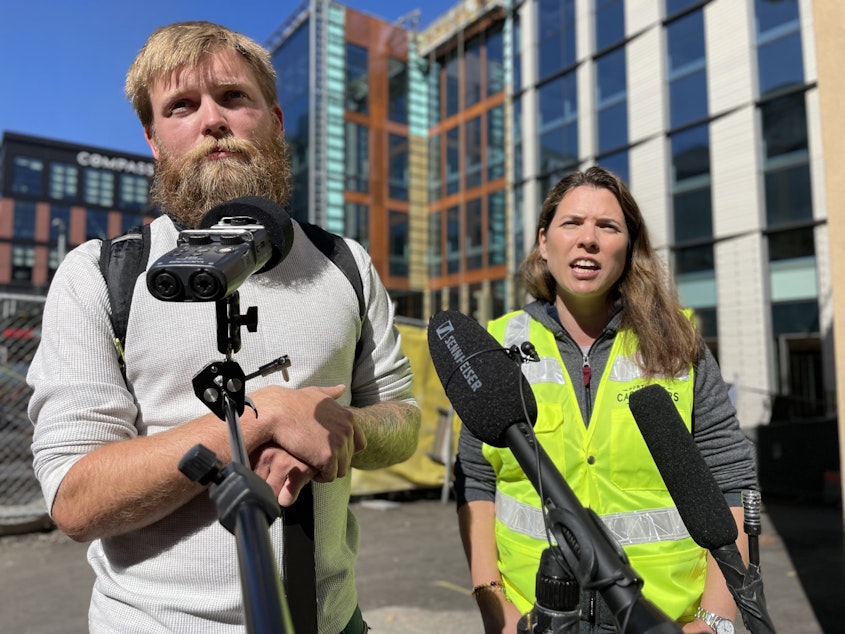NW carpenters say they build the tech offices that make our economy grow, but their pay doesn't show it

In Seattle’s South Lake Union neighborhood, carpenters marched outside a new office tower being built for Google. In Redmond, they marched outside buildings under construction for Microsoft and Facebook.
The construction industry might be booming, but carpenters say their families are struggling.
The Northwest Carpenters Union has gone on strike.
Jim Thompson stood in front of a construction site for a 12 story building called Block 38. The late Paul Allen's development company, Vulcan, is building it for Google.
“Obviously, we have the ultrarich out here building buildings that cost 250 million to a billion dollars. And the carpenters are just asking for their fair share so that our working brothers and sisters out there can live comfortably,” Thompson said.
Union member Lee Carter, also outside Google's project, said carpenters can’t afford homes in urban areas, so they face killer commutes. “I live in Enumclaw, so I actually used to work at this site, and it was about a 47 mile drive one way," he said. "I wake up at 2:30 in the morning every day for work. And I know guys that are driving from the east side of the mountains. Every day, they’re driving 90 to 100 miles one way. It’s just – we’re just trying to be heard.”
Evelyn Shapiro, an officer with the union, described the high cost of parking, gas and commute time as a tax carpenters pay to come to work. She said carpenters need more pay to offset those additional burdens.
Sponsored
Carpenters work for many different general contractors, some big, some small. Many of those contractors don't directly negotiate wages or benefits with subcontractors such as carpenters. Instead, contractors outsource those negotiations to their own organization: the Association of General Contractors of Washington.
The labor agreements that come out of those negotiations govern pay and benefits on many construction sites throughout the region.
But current talks between the Northwest Carpenters Union and the AGC broke down, leading to this week's strike.
In a statement, the AGC referenced internal divisions in the carpenters union that led to the strike. "On August 31, the AGC of Washington accepted the Carpenters’ proposal, which was provided to the members to vote. The AGC of Washington believes the most recent union proposal that was brought forth for ratification was fair. We are disappointed in the outcome but continue to believe that both of our future successes are dependent upon the continuation of our partnership."
The two sides disagree over how to respond to recent inflation. If the recent increases in the cost of living don't come back down to earth soon, then carpenters say the raises they would have gotten under the contract that was offered would amount to nothing. For that reason, they're arguing for raises that exceed recent inflation rates.
Sponsored
Due to previous agreements, the union said it would not strike at jobsites that involve taxpayer money. These include Seattle Public Schools, the Port of Seattle, Sound Transit, and Climate Pledge Arena.
However, Publicola has reported that Seattle City Councilmember Kshama Sawant and her political organization have been promoting unsanctioned "wildcat strikes" that could spread picketing to those locations. Union officer Evelyn Shapiro said Thursday that she did not welcome that interference.

